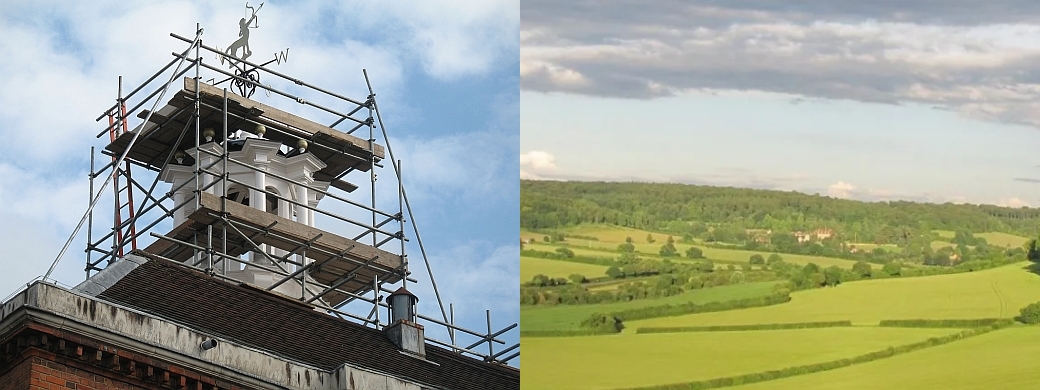
Whenever I leave the country for a few weeks, something crazy happens to it. I still feel guilty about the Falklands War, which broke out during my sojourn in Kuala Lumpur as a consultant to the Malaysian Ministry of Health, which itself happened for a crazy reason. In such circumstances, we happy band of expatriates heard astonishing rumours of an inexplicable event back home. We scoureds the available media for news. In 1982, I had to rely upon the New Straits Times, which reported that in my absence, Margaret Thatcher, with the entire Cabinet and Ministry of Defence too spineless to stop her, had declared war on Argentina; in evidence of which, a Royal Navy fleet was making its stately progress to the pointed end of South America. We could not believe what we were reading; but being away, we had missed the hysteria which must have made it seem rational to the stay-at-homes in England. Moral: you have to be there.

Mind you, it was Margaret Thatcher who created the chain of events that put me in Kuala Lumpur in the first place. In one of her hissy fits she had decided to stop subsidies for foreign students at British universities. In revenge, Malaysian Prime Minister Mahathir decided to throw out all British consultants, of whom I was one. Or was I? I had an Australian passport, and had been working for an associate firm of our London-based consultancy in North Borneo, called Hanafiah, Raslan & Mohammed. Thus I had impeccable local credentials, and on this specious basis, was accepted as not British at all, but a bumiputera, (“son of earth”), an indigenous citizen who was to be encouraged and raised up in accordance with Malaysia’s racially selective policies. So I was attached to an IT project run by a Canadian firm. As it happened they had no use for me, and accordingly gave me an air-conditioned office to myself and allowed me to work on anything I wished. So I drew diagrams and let the hours drag on till I could meet my girl-friend. I was just an item on the bill to the Ministry of Health, part of the price it paid for pursuing its politically-correct racist ideology.
As I was saying, I leave the country for a few weeks and something crazy happens to it. This time, I have only to spend two weeks in Jamaica for a volcano in Iceland to isolate Europe from the world more totally than the submarines of both sides could achieve in the Second World War. But that’s old news that I’ve covered in previous dispatches. I’m talking now about something else. The other phenomenon I was powerless to prevent, on grounds of being out of the country at the time, was a quasi-coup, in which Nick Clegg, leader of the third and hitherto inconsequential party in British politics, suddenly became the acclaimed leader Most Likely to Succeed. This was, it seems, an effect of the televised debates in which the leaders of our three main political parties presented themselves for scrutiny by the electorate. We have a General Election coming up on Thursday. In the British system, you don’t vote for a Prime Minister, only your own geographical

Member of Parliament, from which a party majority is calculated by the number of elected members. The Prime Minister is chosen by the winning party. However these televised debates, in imitation of those in the US, give the impression that we are about to elect our own President.
The parties have gone along with the illusion, and their leaders are assumed to personify their own party. As I understand it, Clegg was the darling (not to be confused with Alastair Darling, the current Chancellor of the Exchequer) on the paradoxical grounds that he talked least like a politician. (A sort of Sarah Palin effect? He’s as handsome as she is pretty, I suppose.) Now I’m back, sanity is resuming. If he didn’t talk like a politician, then what did he talk like? A talk-show host? In the middle between the two main opponents, he kept squeaking against the making of “party political points”—as if he, as Prime Minister, would lead a grand Coalition, in a nation acting as one against the common enemy, a War against Dishonest Politicians and National Bankruptcy.
As for me, I support one party with a deep and instinctive passion; and am delighted that its leader expresses my own views so closely, views I cannot express myself with much coherence. Be thankful for small mercies! And I’m so glad to be back home.

although it was just a mild joke, “As I understand it, Clegg was the darling (not to be confused with Alastair Darling, the current Chancellor of the Exchequer)” really made me laugh.
Anyway, I don't know much about English Politics, but I am curious what is the party you support with a 'deep and instinctive passion'?
Also, that is a nice building. I can't tell from the photos what material the facade is. It almost looks like opal(which I am sure it is not)
LikeLike
Yes the cladding fascinates me too. It is perforated steel, as I discovered when getting up close during construction. I imagine it has been tempered. You know how to temper a chisel or other tool? You heat it to a certain temperature and then “quench” it by suddenly dipping it in water or oil. The surface becomes coloured with a naturally forming oxide, or so I understand it.
Answer to your question: the Conservative Party. It sounds equivalent to your GOP but in everyday practice is further to the Left; whilst the Labour Party (New Labour as it calls itself) is much more to the left, being the party of Big Government which wants to tell everyone what to do, including local government, doctors, police, employers and parents. In contrast the reborn Conservative Party declares its belief in Big Society: everyone is responsible, not just Government.
LikeLike
odd feeling, isn't it – the sense that if you take your eye off things for a moment something will go dreadfully wrong.
There was a period of some years that I read world-wide news with a voracious, scanning appetite – a deep sense that I simply needed to “keep an eye on things.” At the time I was utterly mystified by people who didn't have the same compulsive hunger to understand the nuance of EVERYTHING, EVERYWHERE.
LikeLike
NOT to infer that you are “off” – I, however, definitely WAS. This was after the Bali bombings in 2002, 3 weeks after I returned home from there, which of course was just a year after the world trade center bombings. My compulsion ran it's course, but for several years I read about 5-8 online newspapers daily. For me, I think, there was some deep guilt and dread over simply being American. Our government is at the center of so much that is both very bad and quite good. We always seem to be mixing it up where we shouldn't. Of course, that was before we proved it by starting the current wars.
LikeLike
Hayden, yes, we (some of us) cannot help feeling guiltily responsible for things we cannot in practice control. And I think this betrays a feeling that the administration above us hasn't got a grip on things.
When President Obama took over, there was profound relief worldwide, I think, that the stumbling monster of America, previously a drunken elephant (fittingly the symbol of the republican party which GWBush represented), was now to be tamed and sobered and made responsible for its own actions and its place in the world.
In fact, my piece was playful about this idea rather than representative of my actual feelings. I'm aware of “EVERYTHING, EVERYWHERE”, if only by extrapolation from immediate sense-impressions plus something vaguer. But it's enough to take a calm pride in being a small part of it, and to focus on the minutiae of my own role, tiny as it is.
So whilst you roam over your acres tending orchards, I cut my little lawn with one-handed scissors, welcoming every pest or seedling that chooses to dwell within the open confines of my garden. Though as king of this domain, I may prune and clear those too-exuberant growths which jeopardise the co-existence of their neighbours. And even within this small kingdom, I can pull muscles and suffer for days. (I'm exaggerating here and pruning details, for the sake of brevity.)
Meanwhile in this venerable Island of Britain, and its near neighbour Ulster, it is General Election day, and I have the privilege and duty to place a single X on a slip of paper. All the weeks of national hysteria devolve into one simple decision, marked with the stub of a pencil.
LikeLike
I envy you that stub of pencil. Our insanity – to have accepted machines which maintain no records and can be high-jacked – was irresponsible in the extreme. but then, we've always had a rosy faith in technology that's rarely been justified. part of the 'american way.'
LikeLike
I read this post at the point at which all of it has become history, apart from your description of Sarah Palin. All I can say there is, beauty is in the eye of the beholder, or in her case, her PR creator as well.
My borrowed pencil did its job. I wondered how often the clerks had to sharpen them.
LikeLike
Good to see this Blog is still floating out there in the ether. Quite interesting to be reading this after the (non?)election and subsequent formation of a “government”.
You touch on a point within it that slightly irritated in the post election analysis…and this notion that the country votes for local MPs and not a Prime Minister. I think this is a little naive. Yes technically this is correct, but I think most of us recognise that in general elections it's not local issues that sway votes but national issues and who the prospective PM's are. We only need to look at 1997 and the ongong recognition of the “Blair Effect” on voters nationally.
LikeLike
Good to see you back here, Lehane! And to have the opportunity to argue. I prefer being technically correct to following common misperception. What was the Blair effect on voters nationally? Speaking for myself it was not a nice effect, and it got worse.
LikeLike
Hayden and ZACL, yes I think of that stub of pencil as being the only legitimate way of making a cross. I felt it so important to perform that action, and hoped to find out the effect the next day, in the normal way. “The people have spoken”. But it took some days before its ambiguous message was interpreted by the oracular agency of politicians ganging together. I am rather pleased with the result actually. I think we have a political system that works, and would not want it tinkered with too much.
LikeLike
“As for me, I support one party with a deep and instinctive passion; and am delighted that its leader expresses my own views so closely, views I cannot express myself with much coherence.”
Oh dear, that was then, I’m embarrassed about having supported the Tory party every time until this year, when Sir Keir Starmer leads the Labour party, with the best attitude of any prime minister ever, to my limited knowledge.
LikeLike
[…] are some notes on other clues and answers which require knowledge of English as spoken in Blighty, an old soldiers’ term for […]
LikeLike